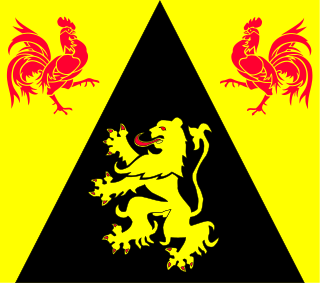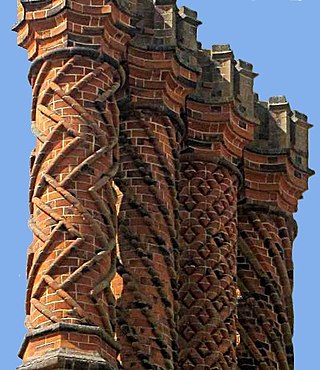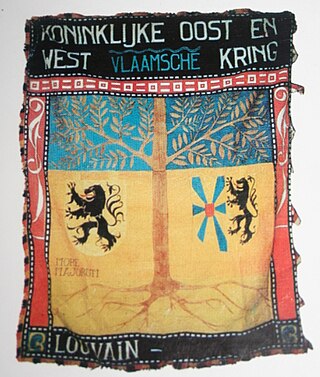
Belgium, officially the Kingdom of Belgium, is a country in Northwestern Europe. The country is bordered by the Netherlands to the north, Germany to the east, Luxembourg to the southeast, France to the south, and the North Sea to the west. It covers an area of 30,689 km2 (11,849 sq mi) and has a population of more than 11.5 million, making it the 22nd most densely populated country in the world and the 6th most densely populated country in Europe, with a density of 376/km2 (970/sq mi). Belgium is part of an area known as the Low Countries, historically a somewhat larger region than the Benelux group of states, as it also included parts of northern France. The capital and largest metropolitan region is Brussels; other major cities are Antwerp, Ghent, Charleroi, Liège, Bruges, Namur, and Leuven.

Brussels, officially the Brussels-Capital Region, is a region of Belgium comprising 19 municipalities, including the City of Brussels, which is the capital of Belgium. The Brussels-Capital Region is located in the central portion of the country and is a part of both the French Community of Belgium and the Flemish Community, but is separate from the Flemish Region and the Walloon Region, located less than 4 kilometres (2.5 mi) to the south. Historically Dutch-speaking, Brussels saw a language shift to French from the late 19th century. Nowadays, the Brussels-Capital Region is officially bilingual in French and Dutch, although French is the majority language and lingua franca. Brussels is also increasingly becoming multilingual. English is spoken widely and many migrants and expatriates speak other languages as well.

The codex was the historical ancestor of the modern book. Instead of being composed of sheets of paper, it used sheets of vellum, papyrus, or other materials. The term codex is often used for ancient manuscript books, with handwritten contents. A codex, much like the modern book, is bound by stacking the pages and securing one set of edges by a variety of methods over the centuries, yet in a form analogous to modern bookbinding. Modern books are divided into paperback and those bound with stiff boards, called hardbacks. Elaborate historical bindings are called treasure bindings. At least in the Western world, the main alternative to the paged codex format for a long document was the continuous scroll, which was the dominant form of document in the ancient world. Some codices are continuously folded like a concertina, in particular the Maya codices and Aztec codices, which are actually long sheets of paper or animal skin folded into pages. In Japan, concertina-style codices called orihon developed during the Heian period (794–1185) were made of paper.

Flanders is the Dutch-speaking northern portion of Belgium and one of the communities, regions and language areas of Belgium. However, there are several overlapping definitions, including ones related to culture, language, politics, and history, and sometimes involving neighbouring countries. The demonym associated with Flanders is Fleming, while the corresponding adjective is Flemish, which can also refer to the collective of Dutch dialects spoken in that area, or more generally the Belgian variant of Standard Dutch. The official capital of Flanders is the City of Brussels, although the Brussels-Capital Region that includes it has an independent regional government. The powers of the government of Flanders consist, among others, of economic affairs in the Flemish Region and the community aspects of Flanders life in Brussels, such as Flemish culture and education.

Walloon Brabant is a province located in Belgium's French-speaking region of Wallonia. It borders on the province of Flemish Brabant and the provinces of Liège, Namur and Hainaut. Walloon Brabant's capital and largest city is Wavre.

Belgium is a federal state comprising three communities and three regions that are based on four language areas. For each of these subdivision types, the subdivisions together make up the entire country; in other words, the types overlap.

The Kingdom of Belgium is divided into three regions. Two of these regions, Flanders and Wallonia, are each subdivided into five provinces. The third region, Brussels, does not belong to any province and nor is it subdivided into provinces. Instead, it has amalgamated both regional and provincial functions into a single "Capital Region" administration.

Brickwork is masonry produced by a bricklayer, using bricks and mortar. Typically, rows of bricks called courses are laid on top of one another to build up a structure such as a brick wall.

The Vrije Universiteit Brussel is a Dutch and English-speaking research university located in Brussels, Belgium. It has four campuses: Brussels Humanities, Science and Engineering Campus, Brussels Health Campus, Brussels Technology Campus and Brussels Photonics Campus.

A cantus, is an activity organised by Belgian, Dutch, German, French, and Baltic fraternities. A cantus mainly involves singing traditional songs and drinking beer. It is governed by strict traditional rules. The use of this dates back a few centuries and was inspired by German student organisations; however some of the songs that are sung date back to the Middle Ages. Cantus probably shares same roots with commercium, sitsit and tableround.

The Aleppo Codex is a medieval bound manuscript of the Hebrew Bible. The codex was written in the city of Tiberias in the tenth century CE under the rule of the Abbasid Caliphate, and was endorsed for its accuracy by Maimonides. Together with the Leningrad Codex, it contains the Aaron ben Moses ben Asher Masoretic Text tradition.

The Flemish Community is one of the three institutional communities of Belgium, established by the Belgian constitution and having legal responsibilities only within the precise geographical boundaries of the Dutch-language area and of the bilingual area of Brussels-Capital. Unlike in the French Community of Belgium, the competences of the Flemish Community have been unified with those of the Flemish Region and are exercised by one directly elected Flemish Parliament based in Brussels.
Arrondissements of Belgium are subdivisions below the provinces of Belgium. There are administrative, judicial and electoral arrondissements. These may or may not relate to identical geographical areas.

Matthias Edward Storme is a Belgian lawyer, academic and conservative philosopher.
The education in the Flemish Community covers the Dutch-speaking part of Belgium and consists of three networks (netten): government-provided education (gemeenschapsonderwijs), subsidized public schools and subsidized free schools.

The Kingdom of Belgium has three official languages: Dutch, French, and German.
Television in Belgium was introduced in 1953 and began with one channel each in Dutch and French. The country is heavily cabled, with 93% of households watching television through cable as of 2003.

The Koninklijke Oost- en Westvlaamsche Kring is a bilingual and nonpolitical student fraternity from Leuven (Belgium) founded November 22, 1922. This fraternity is commonly called the Vla-Vla. The members are originally from or living in East and West Flanders.
Katholiek Vlaams Hoogstudentenverbond (KVHV) or the Catholic Flemish Students' Union is a political student society which concerns Flemish nationalism and conservatism. It accepts male and female members and has chapters in Ghent, Leuven, Antwerp, Brussels, Aalst and Sint-Katelijne-Waver. Previously KVHV had chapters in Kortrijk, Ostend, and Mechelen.

Jozef Maria August Antoon (Jef) Van den Eynde was a prominent figure from Leuven's student life, an activist and member of the Council of Flanders during the First World War. After the war, he fled to the Netherlands, having received a 20-year sentence in absentia for collaboration.















